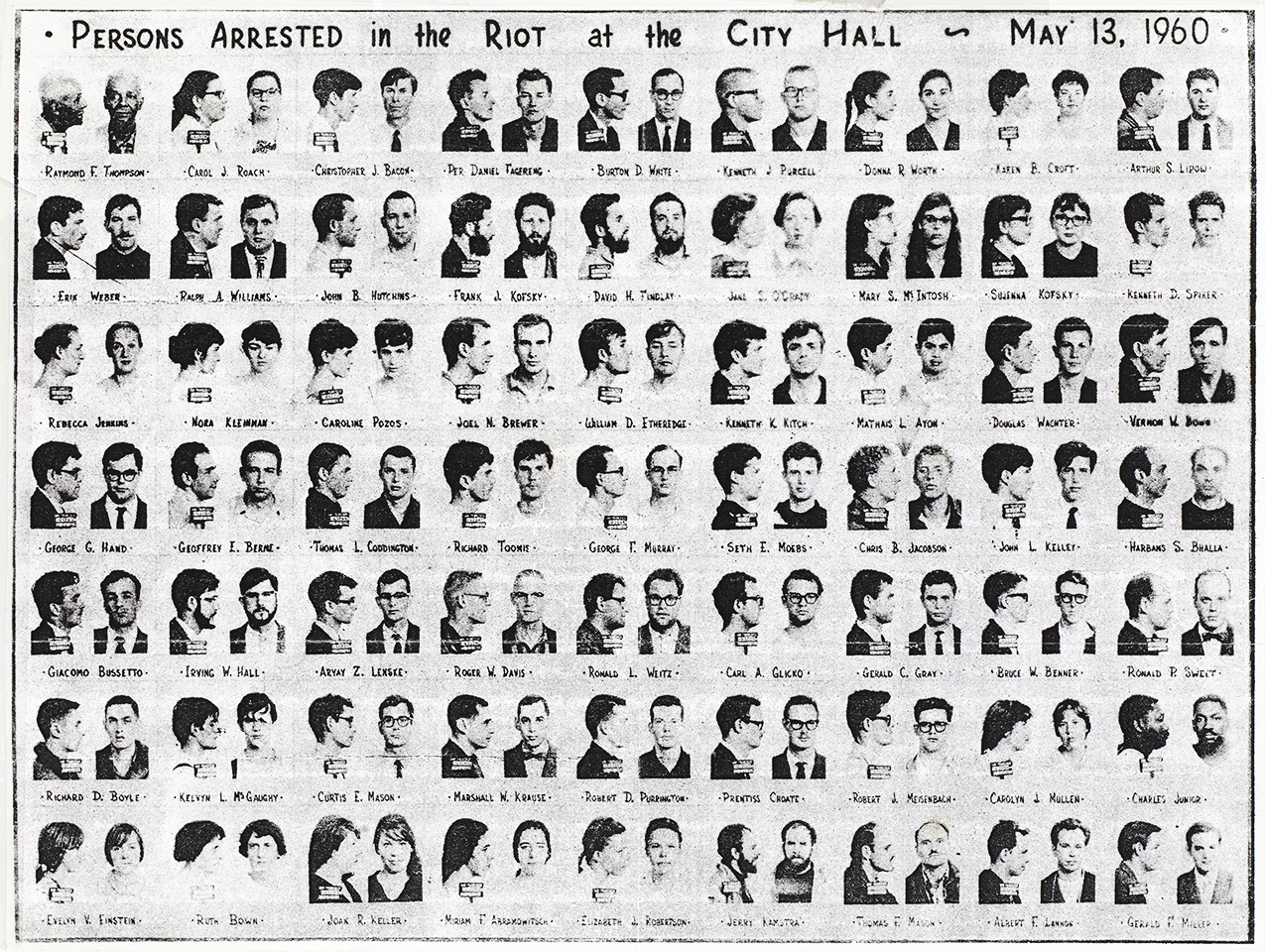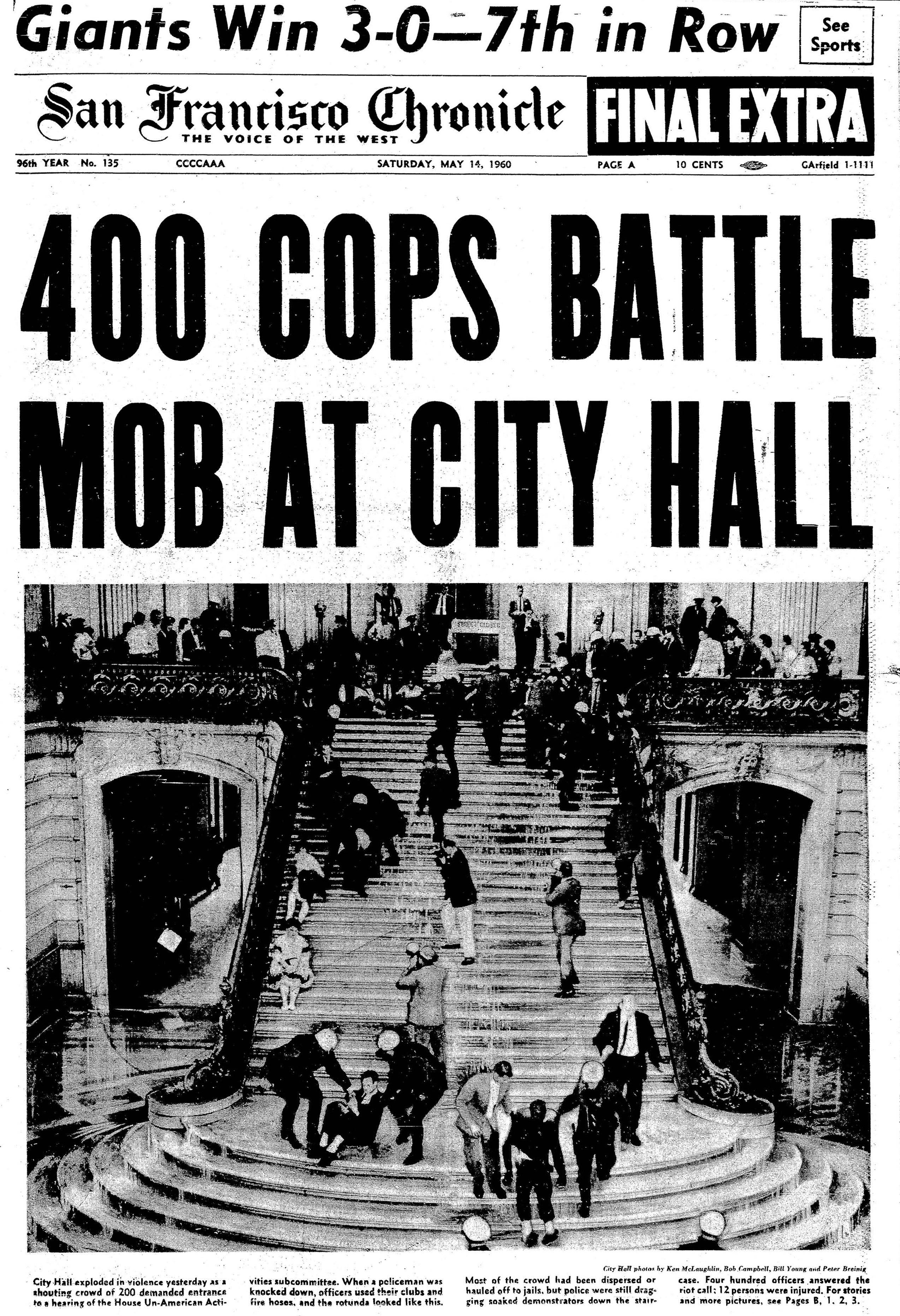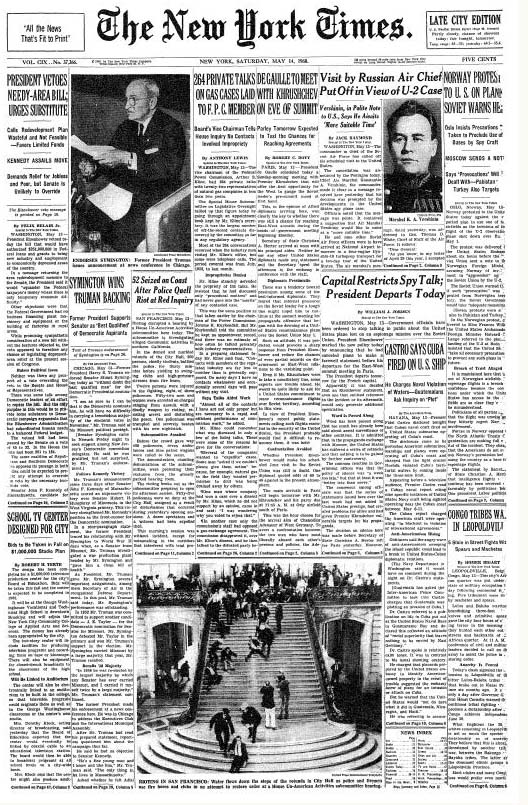Free Speech Movement Documents
BASCAHCUA: Bay Area Student Committee for the Abolition of the House Committee on Unamerican ActivitiesOn the events of May 13, 1960, "Black Friday"
Irving Hall's site
Barbara Stack's siteSan Francisco Chronicle, May 13, 2020,
Uprising at SF City Hall against House Un-American Activities Committee serves as a ‘turning point’ for student protests
BASCAHCUA is an important precursor to the FSM in part because one of its founding members was Michael Rossman, an important intellectual leader of the FSM; another was Burton White, who for KPFA recorded and broadcast many of the important FSM speeches. And as indicated in "Admininstrative Pressures" (see links below), it offered a preview of what might be expected of the Cal Administration in matters of free speech.
Our collection consists of minutes of BASCAHCUA meetings, a number of documents they issued, and others they distributed.
Guide to FSM-A Collection
BASCAHUAC -- Internal Documents (probably authored by Michael Rossman in the 1990s) 1 page
1961 BASCAHCUA Timeline by Michael RossmanEarly UCB Student Interest
1960 05 Graduate Sociology Club ResolutionBASCAHCUA Formation and Meetings
1961 circa BASCAHUAC Outreach
Proposed Constitution
1961 circa The following are the officers of our organization
1961-62 BASCAHCUA Minutes, ExCom, Fin, etc 38 ppBASCAHCUA Publications
1961 circa In Search of the Truth (BASCAHCUA) 8pp
1961 04 The following is the latest revised list of literature available (BASCAHCUA) 8pp
The Meisenbach Case (BASCAHCUA) 1 pageOther Groups
1961 02-22 Operation Abolition (National Council of The Churches of Christ in the U. S. A., pamphlet, 36pp)
1961 03-17 Campus Unrest Potential for Change (The University YWCA and the University YMCA (Stiles Hall) 7 pages
1961 10-03 Chicago Committee to Defend the Bill of RightsUS Government Publications
1960 Communist target: youth. Communist infiltration and agitation tactics. A report by US FBI pdf
1960 Communist Target Youth text
1961 10-05 The Truth About the Film Operation AbolitionAdministrative Pressures and Student Political Activity at the University of California (Rossman Hollander Report)
Appendix on Student Activities
Also here: HUAC: MAY 1960: The events; the aftermathThe University of Wisconsin posts a great summary:
Bay Area Student Committee to Abolish the House Committee on Un-American Activities Records, 1958-1965
As part of a growing national protest against the practices of the House Committee on Un-American Activities (HUAC), on May 12-14, 1960, students from the San Francisco bay area participated in a demonstration to protest a HUAC investigation in San Francisco. When the police attempted to arrest some of the students, violence broke out in the City Hall. Of the 68 arrested on charges of inciting a riot and disturbing the peace, all but Robert Meisenbach, one of the organizers of the demonstration, were immediately cleared of charges. In order to continue their opposition to HUAC, these students met in June, 1960, to form the Ex-Defendants Committee. On September 11, 1960, the group expanded its membership to 125 to become the Bay Area Student Committee to Abolish the House Committee on Un-American Activities (hereafter referred to as BASCAHCUA). The stated purposes of the group were (1) to work for the abolition of HUAC, (2) to publicize the political issues of civil liberties, (3) to establish the truth concerning the events of the May, 1960, demonstration and (4) to secure financial aid for Meisenbach. Although the group had hopes of attracting a large and active membership, throughout its history BASCAHCUA remained an informal student organization, and its activities were carried out entirely by the volunteer labor of a few dedicated members.
Since the committee decided to play an educational role, the greatest part of BASCAHCUA activity was concerned with reprinting and distributing materials about HUAC, Its major effort was an exposé of the biased editing of the HUAC film Operation Abolition in which it appeared that the students in the May, 1960, demonstration were innocent dupes of communist agents. By publicly protesting this representation, BASCAHCUA was responsible for re-introducing the question of the constitutionality of HUAC's existence and for further polarizing national opinion on the subject. In addition to its publication work, BASCAHCUA supplied speakers to discuss the issues involved in Operation Abolition with groups who saw the film. Irving Hall, the treasurer, spoke in many California communities and Burton White, the original chairman, made a national speaking tour in conjunction with the National Committee to Abolish HUAC.
On the local level, BASCAHCUA helped raise funds for the Student Emergency Defense Fund to support the legal defense of Robert Meisenbach. Meisenbach was acquitted on May 3, 1961, in what BASCAHCUA asserted legally substantiated that there were distortions present in Operation Abolition.
At the conclusion of its first year of existence, BASCAHCUA experienced an internal restructuring as a result of a dispute between White, Hall, and the rest of the committee, in which White was eventually removed from office because of his irresponsibility toward the San Francisco group and long absences. The result of this dispute was a constitutional revision which gave control to Hall and the few active members,
A substantial decline in the amount of correspondence in 1962 suggests a lessened public interest in HUAC in favor of other civil rights issues, and increasingly BASCAHCUA's activities were carried on by the loyal few. In January, 1964, the group's finances were liquidated and the remaining records turned over to Hall.
scanned from a copy of the poster belonging to Burton White via Judy Baston and Becky Jenkins.
May 14, 1960: San Francisco Chronicle
May 14, 1960: New York Times



